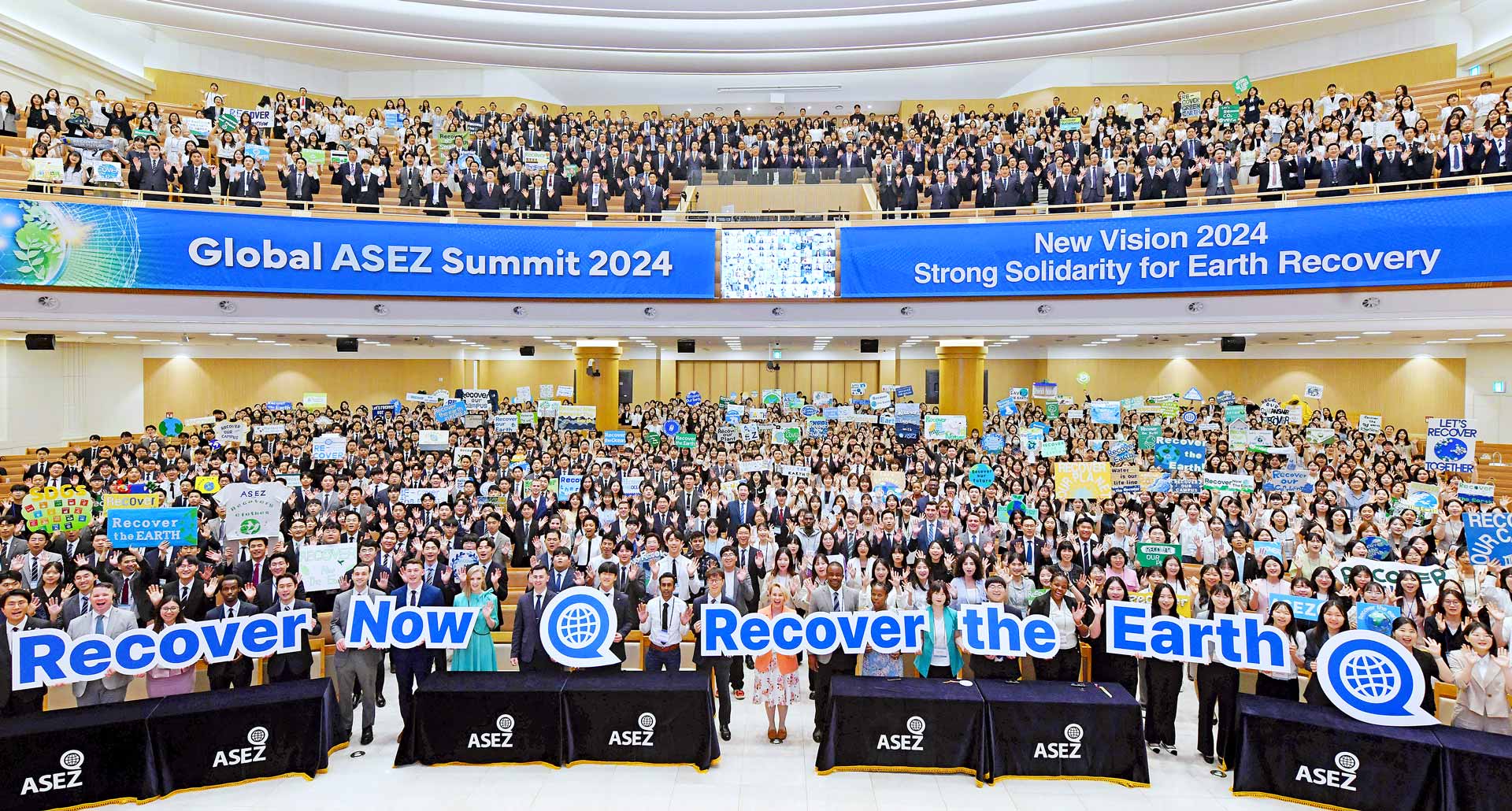Select a Language
Global ASEZ Summit 2024
New Vision: Strong Solidarity for Global Earth Recovery
Korea
The term global warming was first introduced around 50 years ago, and now the world has entered an era of “global tropicalization.” With growing concerns about the future of mankind and the earth’s environment, there is an increasing call for achieving carbon neutrality and preserving biodiversity. The importance of international cooperation to address these challenges is also gaining more attention.
ASEZ, the Church of God University Student Volunteer Group, held an event to raise awareness and explore solutions to these global issues, leveraging its worldwide network of active members. The event was the Global ASEZ Summit 2024, held on June 30 at the New Jerusalem Pangyo Temple. Under the theme “2024 New Vision: Strong Solidarity for Global Environmental Restoration,” this year’s summit brought together about 2,000 ASEZ members, including students from Seoul National University and Korea University in Korea, Harvard University and Tennessee State University in the United States, and international students from Nepal, Ethiopia, and other countries. Additionally, through an online video conference program, nine representatives from different continents proposed agenda items, and 100 members from countries such as Germany, Ghana, Panama, and the Philippines participated in voting on the topics. The event was attended by various dignitaries, including the Laotian Ambassador to Korea, H.E. Songkane Luangmuninthone, President of King Uichin Memorial Association Yi Jun, former Minister of Environment Cho Myung-rae (now a distinguished professor at Dankook University), and Suwon City Council Chairman Kim Ki-jung, along with other notable figures from academia, law, media, and culture who came to support the students’ efforts.
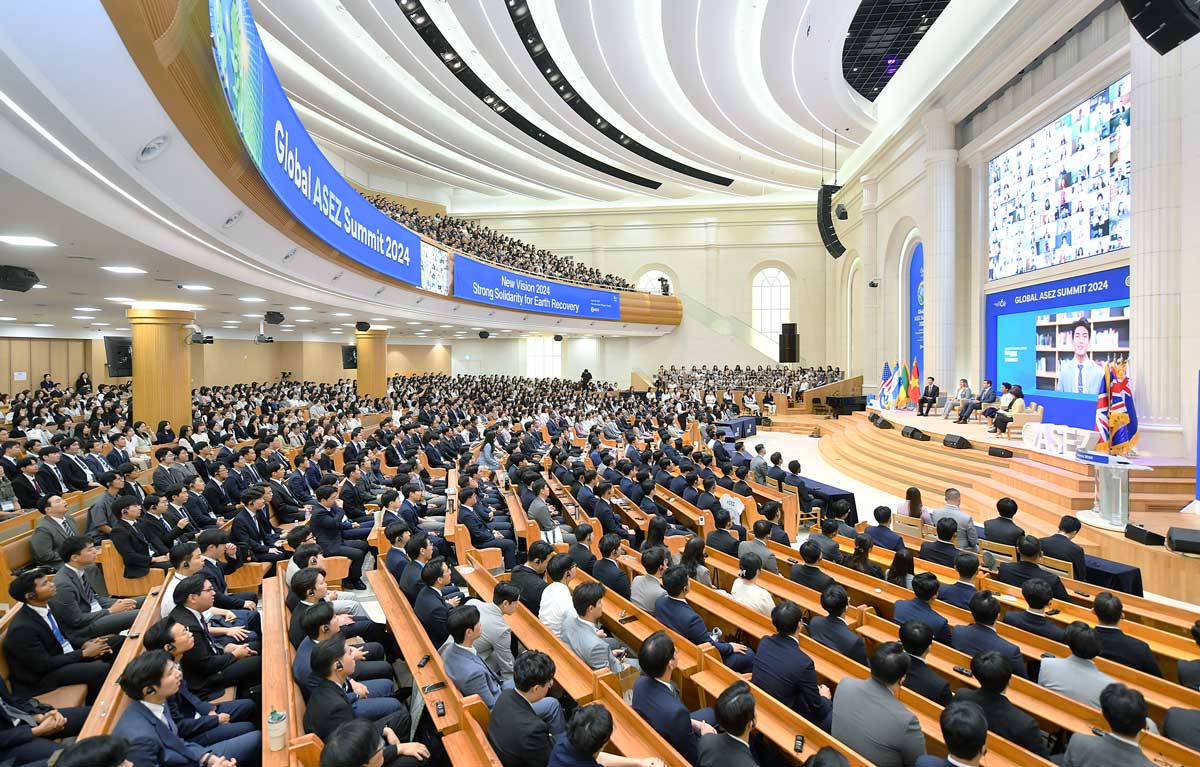

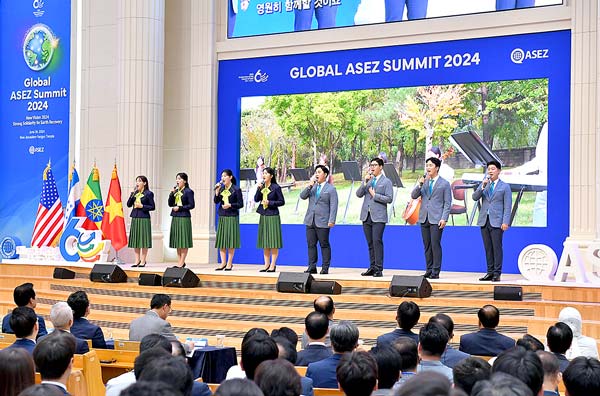
The event included an opening ceremony, expert lectures, panel discussions by continental representatives, and the adoption of a resolution. Before the main program, attendees were welcomed with a video prepared by ASEZ members from different countries, a performance by the ASEZ choir, and a sand art performance that conveyed a powerful message about how collective actions can change the world.
Part 1. Opening Ceremony: Messages of Support for ASEZ’s Efforts to Change the World
In his opening address, General Pastor Kim Joo-cheol said, “ASEZ is a pioneer who leads great change,” and added, “I hope that your efforts, not only within your own communities but also in changing the world as individuals who contribute to the happiness of mankind, will come together to create the sustainable future we all aspire to.” United Nations Secretary-General António Guterres wished success for Summit in his congratulatory message, commending ASEZ’s dedication and anticipating influential results. In his congratulatory address, Laotian Ambassador to Korea, H.E. Songkane Luangmuninthone offered encouragement in his congratulatory address, saying, “Your efforts are crucial in addressing the global challenges we face. I hope today’s event helps in sharing knowledge and building strong networks to create a better world.” Choi Bong-hwan, Chairman of the National Association of Local Council Chairmen, Korea, also gave a congratulatory speech, saying, “When your creative and innovative ideas are translated into practical actions, the influence will change society as a whole.”
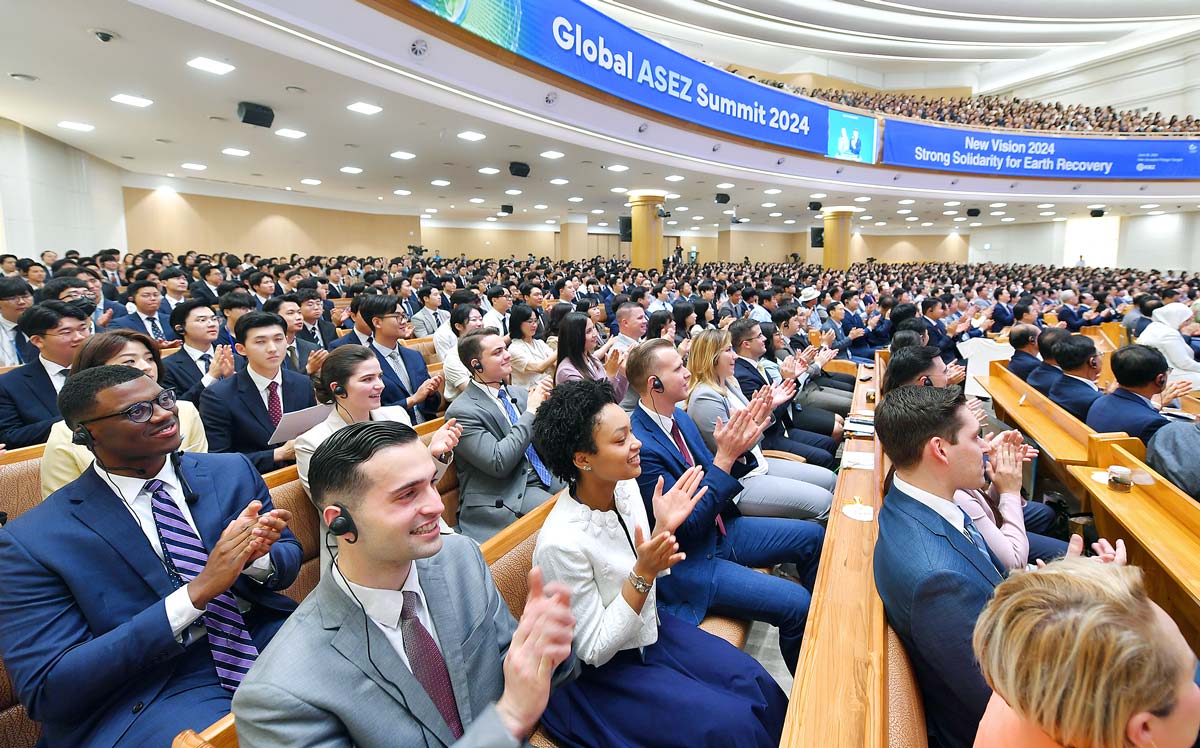
Many other dignitaries, including the Peruvian Prime Minister Gustavo Lino Adrianzén Olaya, the Philippine Ambassador to Korea, H.E. Maria Theresa B. Dizon-de Vega, and the Executive Director of the DaVinci Institute Thomas Frey Futurist sent video messages, expressing their hope that the students attending the summit would grow into leaders driving meaningful change in the international community.
Part 2. University Students’ Summit: Discussing Concrete Methods for Solidarity in Earth Recovery
The summit included expert lectures and discussions among regional representatives. Former Minister Cho Jae-Myeong took the stage, using various indicators to assess the reality of the climate crisis mankind is facing. He explained response strategies such as reducing carbon emissions and restoring ecosystems for carbon capture. “A paradigm shift in society is necessary to achieve carbon neutrality,” he emphasized, urging young adults to take action with interest in various and long-term efforts for this. Chris Melzer, Senior External Relations Officer at UNHCR, the UN Refugee Agency, delivered a video lecture highlighting the issue of climate refugees and outlining the direction of humanitarian activities needed in the era of climate crisis.

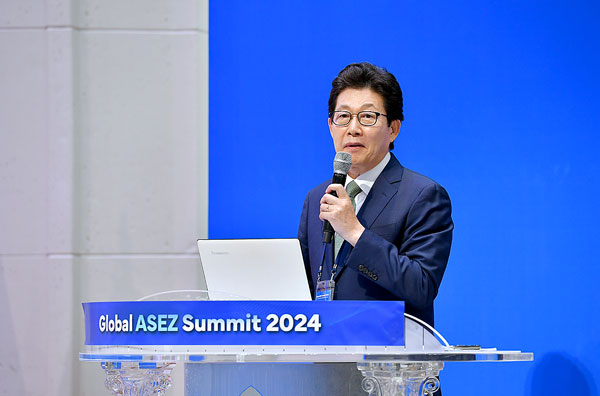
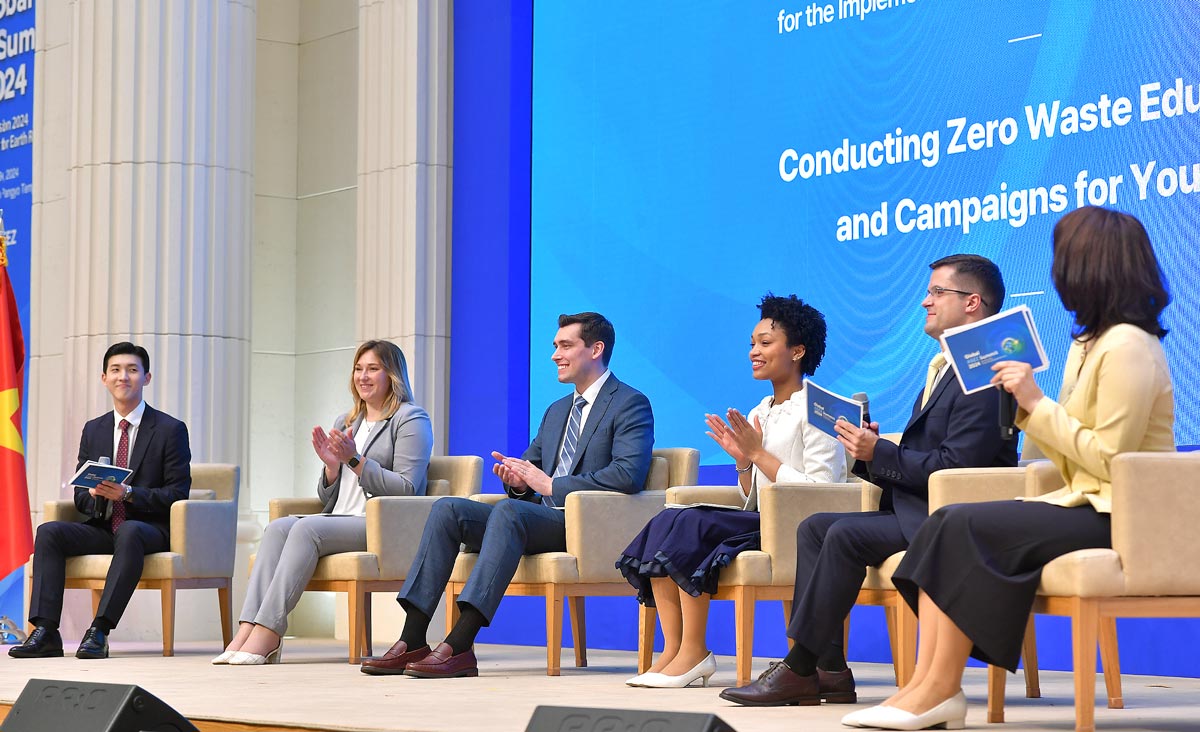
Following this, ASEZ representatives from different continents presented on environmental challenges, including deforestation, desertification, land ecosystem pollution, and biodiversity loss, as well as possible solutions. Representatives from North America, who attended in person, and those from five other continents, who participated virtually, engaged in lively discussions. The panelists, drawing from their experiences in environmental activities in their own countries, proposed concrete measures such as establishing a student network to advocate for government-level environmental protection policies, creating “Earth Recovery Zones” for peatland1 restoration, and conducting “Zero Waste” education and campaigns for teenagers. They expressed a strong consensus on the necessity of global solidarity to implement these initiatives.
1 Peatland: Land where organic material, such as plant remains, has accumulated over thousands of years without decomposing.
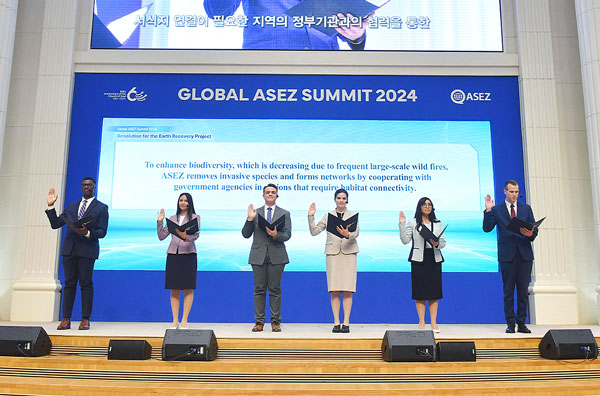

After the discussion, 100 online participants voted on all the proposed agendas. Six ASEZ representatives took the stage to read the final adopted resolution for the Earth Recovery Project, a global student commitment to carrying out the project. Based on this resolution, ASEZ will intensify its efforts in ecosystem restoration activities and awareness-raising campaigns, utilizing its global university student network.
Nas Thomas from Harvard University said, “The climate crisis is a global issue that affects everyone, not just one nation. Knowledge alone, without action, cannot address it. As a member of ASEZ, I will work through various environmental activities to inspire more people to join in and stand together.” Yoon Seong-soo from Sungkyunkwan University said, “Although an individual’s influence is small, when each person contributes, humanity as a whole can solve the climate problems. I’ll be committed to raising awareness for this cause.”
International student Cheng Xiaoxiao from Kyung Hee University shared, “Today was my first time discussing such a topic since coming to Korea. It was a meaningful experience to exchange ideas with fellow students who possess abundant knowledge and creativity for environmental restoration.” Professor Park Jung-hoon from the University of Seoul remarked, “Young people are the ones who will become the backbone of future society. If they lead the way in solving problems, all generations will join them.” He expressed hope that the ASEZ summit would be the starting point for environmental protection efforts across all generations.

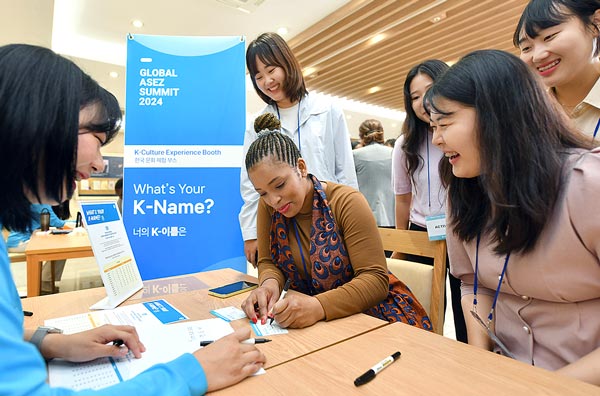

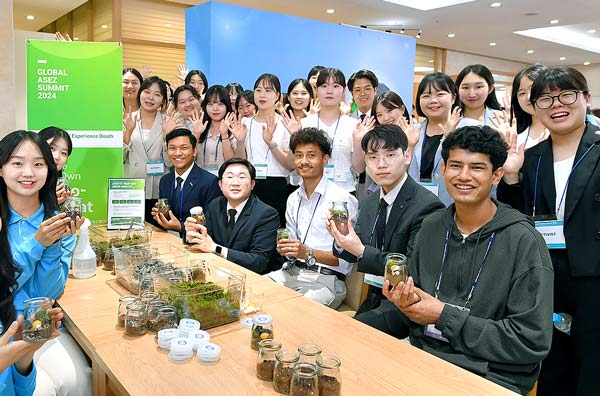
ASEZ members closely observe the society around them from various perspectives, creating and implementing practical ideas to build a better world. Through previous ASEZ summits in 2019 and 2023, they also developed and executed action plans for creating a crime-free world and sustainable society. The changes that these young people, united in their commitment to environmental recovery, will bring about in collaboration with various sectors are eagerly anticipated.
- Global University Students’ Resolution for Implementing the Earth Recovery Project
- Education
- Implementing “Zero Waste” education and campaigns focused on reusing and recycling waste.
- Conducting UNESCO-certified “Eco-Friendly Consumption Education” to raise consumer awareness.
- Practice
- Restoring peatlands to preserve biodiversity.
- Carrying out large-scale environmental restoration activities and awareness campaigns to restore terrestrial ecosystems.
- Partnerships
-
- Forming partnerships with policy-making institutions based on the university student network to establish policies for restoring the Amazon.
- Creating a network to remove and manage invasive species, and to promote biodiversity.
